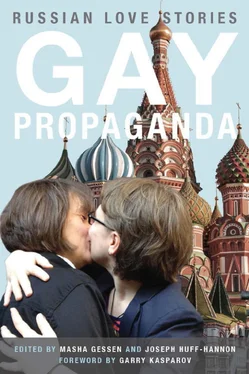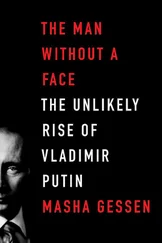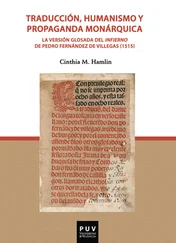In the stroke of a pen, the inner lives of millions of citizens in a vast, diverse country of over 140 million people across nine time zones were now banned, legally shoved back into the shadows after a slow but steady thaw following the collapse of the Soviet Union.
Bullshit. But also strategically brilliant if you take its intent and its consequences at face value: to whip up cheap, crude populism against a minority who can’t fight back in the media in a country with legendary corruption and a newly mobilized civil society movement that the government is desperate to crush. To make it next to impossible for queer people in Russia to demand equal rights, or even be heard or seen in the public square. To make it illegal for gay men and women to have any representation in television, art, film, or any other medium that reaches the masses. And to make it impossible to publish a book about Russian men and women, living very Russian lives, savoring, seeking, and sometimes suffering through very Russian loves. It made a book like this feel inevitable, necessary, and urgent.
So when the idea began to take shape, and as I wondered how I could possibly pull it off from thousands of miles away, my first ideal co-conspirator was Masha, whose work I’d been following and whose reputation I knew. I remembered that my curly-haired Russian friend Boris was a distant cousin, wrangled her contact information out of him, and sent her a long note about the idea behind this book, a collection of real, contemporary Russian love stories.
We’d call it Gay Propaganda .
MASHA
I was not very nice. I did not need another project. And I didn’t need another well-intentioned American suggesting a way to educate the Russian public, based on the good-hearted but thoroughly misguided notion that if only the Russian people knew more gays and lesbians, all of this would go away. What a load of crap.
Our problem was not public homophobia; our problem was the Kremlin, which had launched a campaign against us, the quintessential “foreign agent,” the ultimate Other. Patriarch Kirill, the head of the Russian Orthodox Church, had said the growing international trend toward legalizing same-sex marriage was a sign of the coming Apocalypse.
A leading commentator on Channel 1, which beams into 98% of Russian households, recorded a series of segments explaining that LGBT people are the Antichrist. The Number Two person in the state broadcasting establishment hosted a show on the question of whether banning “homosexual propaganda” was enough and opined that it was not: “We must also ban blood and sperm donations by them. And if they should die in car accidents, we need to bury their hearts underground or burn them, for they are unsuitable for the aiding of a human life.”
It was classic war rhetoric—showing gay people to be both extremely dangerous and less than human—and it was being fed to the public in enormous doses and on a regular basis. You cannot educate against that, and I’m not even sure that trying to do so is a good idea.
I became aware of the anti-gay campaign late: I hadn’t watched state television in years and apparently didn’t associate with anyone who did. I knew about local anti-gay legislation and didn’t take it seriously. But in March 2012, St. Petersburg, the country’s second-largest city, passed a ban on “homosexual propaganda,” and it became clear that the parliament would soon take up the federal version of the bill.
“What are we going to do?” I asked my girlfriend. “Are we buying new cars, or are we selling everything and getting the hell out?” Darya had just given birth to our third child, and it turned out our two tiny cars couldn’t accommodate a child seat or fit a stroller in the trunk, so I had started shopping for bigger cars. But this also meant that we now had three children—three minors living in the house—and we would be in violation of the “homosexual propaganda” bill every time we touched, kissed, or neglected to tell our children that our family was not equal to the neighbors’. I was uncharacteristically panicked. Darya, who was usually the voice of caution in the family, said, “Screw it. We’re staying. This cannot be.” I think sometimes lactation produces a false sense of security.
I went on TVRain, the largest independent television channel (whose reach, estimated most optimistically, is one-seventh that of the state-dominated channels), and recorded a call to arms. I showed pictures of my family and talked about the fact that the new law would effectively make it illegal for me to parent. I talked about the fact that the bill enshrined second-class citizenship into law. I asked all people of good will to put on pink triangles in protest against the looming fascism. I printed up 6,000 pink-triangle buttons and got rid of most of them very soon. In my insular Moscow world it felt like the tide might turn.
What I also did by recording that clip was make the fight personal. Gay rights efforts had always succeeded by putting a human face on the issue, and I was using that strategy. But it also meant that for the first time in many years of being an opposition journalist and activist in Russia I had marked not just myself but also my family as a target. And the fight became personal.
Vitaly Milonov, the St. Petersburg politician who was one of the main spokespeople for the “propaganda” bill, told the country’s highest-circulation daily that Russian orphans needed to be saved from “perverted families like Masha Gessen’s” (our oldest son is adopted). The Kremlin’s Nashi youth movement accused me of being on a personal campaign to destroy the Russian Orthodox family. Yelena Mizulina, the head of the parliament’s committee on the family, vowed to create a mechanism for removing children from same-sex families. Dmitry “Enteo” Tsorionov, the leader of an anti-gay Orthodox activist movement, publicly volunteered to adopt my children. He also personally beat me up during a protest in front of the parliament the day the “propaganda” bill became federal law.
In June 2013, we admitted that we as a family had lost the war; we needed to get out of Russia. We set the deadline for the end of the 2013/2014 school year, and a month later, when it became clear to me that the bill on removing parental rights from LGBT parents would probably pass in the spring of 2014, we moved the deadline up to the end of December. We would be spending the fall dismantling twenty years of living in Russia. I would have to find a buyer for my yellow Mini Cooper with a red interior and less than ten thousand miles on the odometer, and set up a place to live, schools for our kids, and work in New York. So I definitely did not need another project.
But when Joseph finally chased me down on Skype, he, mercifully and surprisingly, said nothing about educating the Russian public. In fact, he hardly seemed misguided at all. And when he sent me Tatiana’s story, I realized what he was suggesting: this would be a samizdat project, the telling of stories for a small audience that needed it. I remembered reading (and typing and binding) samizdat publications as a child and a teenager in the former Soviet Union, and I remember what they did for me: they affirmed my view of existence; they let me know that my parents and I were not the only ones who thought differently. Some of these books contained stories of a different reality; others exposed the reality in which I lived; but the most important ones gave voice to things I would have wanted to say myself. Nobody dreamed of using samizdat to educate the larger society; its mission was to facilitate communication among like-minded people, and to help them locate one another. When I was a teenager, samizdat kept me sane. I needed this now.
The process of putting this book together was messy, difficult, and seriously flawed. Aiming to publish the book before the Sochi Olympics, we needed to work very fast. It was extremely hard for the journalists who conducted some of the interviews to talk to people most affected by the new laws: people who have children, especially gay male couples with children, and people who don’t live in Moscow or St. Petersburg and don’t have good jobs.
Читать дальше












